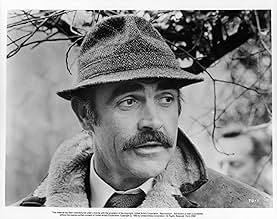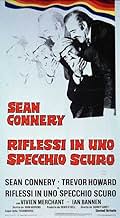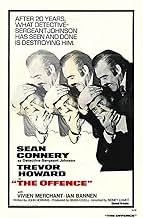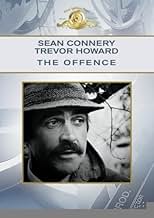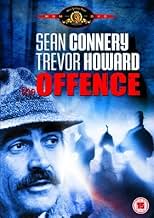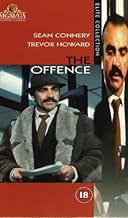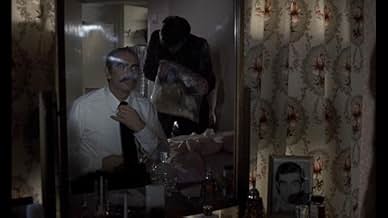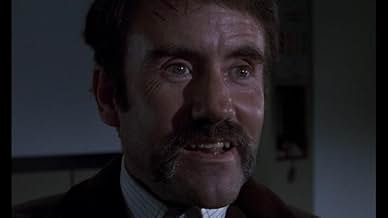AVALIAÇÃO DA IMDb
6,9/10
8,7 mil
SUA AVALIAÇÃO
Um esgotado detetive da polícia britânica finalmente surta enquanto interrogava um suspeito de molestar crianças.Um esgotado detetive da polícia britânica finalmente surta enquanto interrogava um suspeito de molestar crianças.Um esgotado detetive da polícia britânica finalmente surta enquanto interrogava um suspeito de molestar crianças.
- Indicado para 1 prêmio BAFTA
- 1 indicação no total
John Cannon
- Police Constable
- (não creditado)
Les Conrad
- Detective
- (não creditado)
Timothy Craven
- Ambulance Man
- (não creditado)
Avaliações em destaque
Lumet is at his best when he's close to filmed stage production:"twelve angry men" "dog day afternoon" "deathtrap" and even "murder on the orient express"are good examples.That is to say "The offence" is a talky work,par excellence the psychological drama.They say Sean Connery had to make another Bond (diamonds are forever) to be able to portray this cop.He made it a winner:it's one of his three best parts in the seventies with "the man who would be king" (1975)and "Robin and Marian" (1976).These three films cast him as an anti-hero(Huston's work),a has -been legendary character (Lester's) and here a psychotic cop:demeaning parts indeed,a million miles away from James Bond -but even when he was in his Bond era,Connery had made "the hill" with Lumet,another anti-hero part-
"The offence" appears first as another serial killer story.But the script focuses on a cop,and we are far from the cardboard character we have encountered so many times since (eg the alcoholic but handsome detective ,naturally a divorcée ,who finds love again and redeems himself:if you're looking for that ,and horrible crimes ,pass by).Connery's man psyche is shot ."I would not have your thoughts" says the suspect who reveals a deep malaise.Actually,we will never completely know what's going on in the cop's mind:his job seems to have driven him insane ,and at home,he's a frustrated husband (You're not a beauty,he tells his wife,you're not even pretty).Atrocious pictures fleetingly appear on the screen,building some incomplete jig-saw puzzle. But it's Connery's portrayal,at once frightening and pitiful,which gives the movie its incredible strength and the supporting cast is up to scratch.
"The offence" appears first as another serial killer story.But the script focuses on a cop,and we are far from the cardboard character we have encountered so many times since (eg the alcoholic but handsome detective ,naturally a divorcée ,who finds love again and redeems himself:if you're looking for that ,and horrible crimes ,pass by).Connery's man psyche is shot ."I would not have your thoughts" says the suspect who reveals a deep malaise.Actually,we will never completely know what's going on in the cop's mind:his job seems to have driven him insane ,and at home,he's a frustrated husband (You're not a beauty,he tells his wife,you're not even pretty).Atrocious pictures fleetingly appear on the screen,building some incomplete jig-saw puzzle. But it's Connery's portrayal,at once frightening and pitiful,which gives the movie its incredible strength and the supporting cast is up to scratch.
Arguably the best of Sidney Lumet's British films, this one benefits from a brilliant script by John Hopkins and a tour-de-force performance by Sean Connery as a cop who's been pushed too far. The interrogation scenes between him and an excellent Ian Bannen, as the prime suspect in a child molestation case, are riveting. Hopkins' dialogue is uncannily subtle in its gradual illumination of the psychological states of its two antagonists. Vivien Merchant is exceptional as Connery's emotionally-drained spouse. Gerry Fisher's cold, muted photography perfectly captures the sterility and bleakness of post-modern England. This is not a fun film, but its truths about the fragility of the human psyche are eloquently conveyed.
Sean Connery is more a superstar than an actor. Although his talents have been recognised by the Academy (for his rather unconvincing turn as an Irish cop in The Untouchables (1987)) and remembered for his role as the first James Bond, he is high up on his own pedestal, a gift for voice actors and one of the handsomest faces ever to have graced the screen. But anyone in doubt of his ability as a proper thespian need look no further than his grim, tormented portrayal of a cop who has seen one too many dead bodies in Sidney Lumet's The Offence, a huge flop at the box office and a film now faded into memory, ripe for a re-discovery.
Playing with time Rashomon (1950)-style, the film begins in slow motion, where an unknown disturbance at a police station has a few officers panicked. It is revealed to be Detective Sergeant Johnson (Connery) standing over the bloodied body of suspect Kenneth Baxter (Ian Bannen), with fellow police officers scattered on the floor. It then goes back, and we are in a grey, miserable city gripped in panic as a child-killing paedophile roams free. The latest disappearance of a young girl has Johnson riled, and officers cruising the street pick up Baxter, who is wandering alone in the night covered in mud. The young girl is found raped but alive by Johnson himself, who insists on spending some time alone with the suspect.
Based on John Hopkins' stage play This Story of Yours, Connery fought tooth-and-nail to adapt it for the big screen, eventually reprising his role as Bond in Diamond Are Forever (1971) in return for the green-light. Although the film consists of long, talky scenes, Lumet uses stylish editing in order to avoid being stagy and to delve further into his anti-hero's head. His reputation as a no- nonsense director betrays him here, as scenes of gruesome murders, body parts, and a host of other atrocities Johnson has witnessed flash before our eyes. The use of slow motion in the flashback moments also employs a sort of circular filter at the centre of the screen, reflecting Johnson's disconnection from his actions but getting slightly tiresome in the process.
There are three long, outstanding scenes. The first is Johnson returning home to his wife (Vivien Merchant) following his interrogation of Baxter, drinking heavily and exploding at the one person who could possibly help him. The second is Johnson's own interrogation with superintendent Cartwright (the ever-excellent Trevor Howard), a man who has witnessed the same level of horror himself, but has learnt to separate his work from his life, something Johnson is unable to do. The third is the extended interrogation of Baxter, where Bannen's creepy turn surely must have been an inspiration for the Joker-Batman verbal showdown in The Dark Knight (2008). It's incredibly bleak stuff, but the raw honesty of the script and performances makes this powerful stuff.
www.the-wrath-of-blog.blogspot.com
Playing with time Rashomon (1950)-style, the film begins in slow motion, where an unknown disturbance at a police station has a few officers panicked. It is revealed to be Detective Sergeant Johnson (Connery) standing over the bloodied body of suspect Kenneth Baxter (Ian Bannen), with fellow police officers scattered on the floor. It then goes back, and we are in a grey, miserable city gripped in panic as a child-killing paedophile roams free. The latest disappearance of a young girl has Johnson riled, and officers cruising the street pick up Baxter, who is wandering alone in the night covered in mud. The young girl is found raped but alive by Johnson himself, who insists on spending some time alone with the suspect.
Based on John Hopkins' stage play This Story of Yours, Connery fought tooth-and-nail to adapt it for the big screen, eventually reprising his role as Bond in Diamond Are Forever (1971) in return for the green-light. Although the film consists of long, talky scenes, Lumet uses stylish editing in order to avoid being stagy and to delve further into his anti-hero's head. His reputation as a no- nonsense director betrays him here, as scenes of gruesome murders, body parts, and a host of other atrocities Johnson has witnessed flash before our eyes. The use of slow motion in the flashback moments also employs a sort of circular filter at the centre of the screen, reflecting Johnson's disconnection from his actions but getting slightly tiresome in the process.
There are three long, outstanding scenes. The first is Johnson returning home to his wife (Vivien Merchant) following his interrogation of Baxter, drinking heavily and exploding at the one person who could possibly help him. The second is Johnson's own interrogation with superintendent Cartwright (the ever-excellent Trevor Howard), a man who has witnessed the same level of horror himself, but has learnt to separate his work from his life, something Johnson is unable to do. The third is the extended interrogation of Baxter, where Bannen's creepy turn surely must have been an inspiration for the Joker-Batman verbal showdown in The Dark Knight (2008). It's incredibly bleak stuff, but the raw honesty of the script and performances makes this powerful stuff.
www.the-wrath-of-blog.blogspot.com
British film adaptation of John Hopkins' play "This Story of Yours", penned by the playwright, concerns a troubled 20-year veteran of the police force privately interrogating a suspicious-seeming man picked up the same night a schoolgirl was found molested in the woods. The accused almost inadvertently manages to get inside the other man's head until the tables are turned and it's the cop who is suddenly examining his own dark, turbulent thoughts (he's forced to see the ugly truth, that the two men are not unlike each other). Extremely heavy (as it must be) and unrelievedly talky, the film, directed by Sidney Lumet, is a psychological think-piece, one that was very important to its star, Sean Connery. Erasing all traces of James Bond, Connery sinks deep into this tortured character, with Ian Bannen riveting as the suspect. The film begins confusingly, and audiences must get over another hurdle: a second-act argument between Connery and his wife that eats up a lot of time on the clock. Those who stick with it, however, will find the adult material tense, intriguing and haunting. **1/2 from ****
A burnt-out British police detective investigates some astonishing crimes but after 20 years what Inspector-Sergeant Johnson (Sean Connery) has seen and done is destroying him. Things go wrong when eventually snaps whilst interrogating a suspected child molester called Baxter (Ian Bannen) . During the course of the interrogation takes place several surprises , twists and unexpected consequences.
Interesting and grim picture with tight editing , magnificent acting , thrills , plot twists , emotion and intense drama . It was originally conceived as a tense as well as thrilling flick about a complex interrogatory . It results to be an adaptation of a stage play titled : ¨This story of yours¨ by John Hopkings about a claustrophobic and strange duel betwen a suspicious child molester and a police officer obsessively convinced of his guilt , both of whom find themselves subtly changing places . Gripping and exciting picture about a cop who wants to investigate a grisly killing with unexpected consequences , outstanding the great Sean Connery playing very well a London detective who explodes at a police interrogation reacting against a child molester . Embedded in a realistic police procedure , thorny dialog and peculiar situations nowadays have a ring of arty melodrama ; nevertheless, riveting at times. Support cast is really excellent , such as: Trevor Howard, Vivien Merchant as starring's wife , Peter Bowles and especially Ian Bannen as prime suspect in a series of brutal attacks on young girls.
The motion picture was compellingly directed by the splendid US director Sidney Lumet , though here he failed at box-office. After starting an off-Broadway acting troupe in the late 1940s, he became the director of many television shows in the 1950s. Lumet made his feature film Adaptation of directing debut with 12 Angry Men (1957), which won the Golden Bear at the Berlin Film Festival and earned three Academy Award nominations. The courtroom drama, which takes place almost entirely in a jury room, is justly regarded as one of the most auspicious directorial debuts in film history. Lumet got the chance to direct Marlon Brando in The Figitive Kind (1960), an imperfect, but powerful adaptation of Tennessee Williams'. Sidney Lumet was a master of cinema , best known for his technical knowledge and his skill at getting first-rate performances from his actors and for shooting most of his films in his beloved New York . He made over 40 movies , often complex and emotional , but seldom overly sentimental . He achieved great successes such as ¨Serpico¨, ¨The Veredict¨, ¨Fail safe¨ , ¨ Morning after¨, ¨The hill¨ , ¨Dog day afternoon¨, ¨Murder on the Orient Express¨ , ¨Network¨ , ¨The Anderson tapes¨and his best considered one : ¨12 angry men¨ . In 2005 , Sidney Lumet received a well-deserved honorary Academy Award for his outstanding contribution to filmmaking. Rating . 6.5/10 . Above average . Well worth watching .
Interesting and grim picture with tight editing , magnificent acting , thrills , plot twists , emotion and intense drama . It was originally conceived as a tense as well as thrilling flick about a complex interrogatory . It results to be an adaptation of a stage play titled : ¨This story of yours¨ by John Hopkings about a claustrophobic and strange duel betwen a suspicious child molester and a police officer obsessively convinced of his guilt , both of whom find themselves subtly changing places . Gripping and exciting picture about a cop who wants to investigate a grisly killing with unexpected consequences , outstanding the great Sean Connery playing very well a London detective who explodes at a police interrogation reacting against a child molester . Embedded in a realistic police procedure , thorny dialog and peculiar situations nowadays have a ring of arty melodrama ; nevertheless, riveting at times. Support cast is really excellent , such as: Trevor Howard, Vivien Merchant as starring's wife , Peter Bowles and especially Ian Bannen as prime suspect in a series of brutal attacks on young girls.
The motion picture was compellingly directed by the splendid US director Sidney Lumet , though here he failed at box-office. After starting an off-Broadway acting troupe in the late 1940s, he became the director of many television shows in the 1950s. Lumet made his feature film Adaptation of directing debut with 12 Angry Men (1957), which won the Golden Bear at the Berlin Film Festival and earned three Academy Award nominations. The courtroom drama, which takes place almost entirely in a jury room, is justly regarded as one of the most auspicious directorial debuts in film history. Lumet got the chance to direct Marlon Brando in The Figitive Kind (1960), an imperfect, but powerful adaptation of Tennessee Williams'. Sidney Lumet was a master of cinema , best known for his technical knowledge and his skill at getting first-rate performances from his actors and for shooting most of his films in his beloved New York . He made over 40 movies , often complex and emotional , but seldom overly sentimental . He achieved great successes such as ¨Serpico¨, ¨The Veredict¨, ¨Fail safe¨ , ¨ Morning after¨, ¨The hill¨ , ¨Dog day afternoon¨, ¨Murder on the Orient Express¨ , ¨Network¨ , ¨The Anderson tapes¨and his best considered one : ¨12 angry men¨ . In 2005 , Sidney Lumet received a well-deserved honorary Academy Award for his outstanding contribution to filmmaking. Rating . 6.5/10 . Above average . Well worth watching .
Você sabia?
- CuriosidadesWhen Sean Connery agreed to return as James Bond in 007 - Os Diamantes São Eternos (1971), as part of his deal, United Artists had to back two movies of his choice that would cost $2 million or less. This was to be the first; a Connery-directed version of "Macbeth" was to be the second. When this movie failed at the box office and Roman Polanski beat Connery to the screen with Macbeth (1971), Connery's version of "Macbeth" was cancelled.
- Erros de gravaçãoA ladder leaning against the wall in the hallway outside of the police interrogation room is clearly labeled "TFS" for "Twickenham Film Studios."
- Citações
Kenneth Baxter: Nothing I have done can be one half as bad as the thoughts in your head.
- ConexõesFeatured in Big Screen: The Battle of the Bonds (1998)
Principais escolhas
Faça login para avaliar e ver a lista de recomendações personalizadas
- How long is The Offence?Fornecido pela Alexa
Detalhes
- Data de lançamento
- Países de origem
- Idioma
- Também conhecido como
- The Offence
- Locações de filme
- The Carnival Public House, Battersea, Londres, Inglaterra, Reino Unido(pub scene: interior)
- Empresa de produção
- Consulte mais créditos da empresa na IMDbPro
Bilheteria
- Orçamento
- US$ 900.000 (estimativa)
Contribua para esta página
Sugerir uma alteração ou adicionar conteúdo ausente

